|
|
The Story of 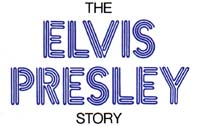
by Ron Jacobs |
I was never happy with the audio quality of The History of Rock and Roll. Voices were recorded quickly, on the phone. On many of these the sound was subpar. I left KHJ in 1969 watching for a better vehicle and conditions in which to produce it. At our new company, Watermark, I checked out spoken word records. Movie rights to books might sell for a million dollars, but this was not the case for permission to make record albums from books.
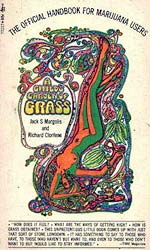
A Child's Garden of Grass |
A friend, Jack S Margolis, showed me the manuscript for his daring new book, A Child's Garden of Grass. I asked the publishers, Simon & Schuster, about the cost of audio rights for the book. No such figure had even been established. We purchased them for next to nothing.
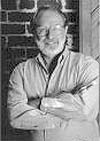
Jerry Hopkins |
I first met Jerry Hopkins in the mid-60s while he was writing for the Steve Allen Show. At the end of 1969, Hopkins began a project suggested to him by Jim Morrison: The life story of Elvis Presley. (It would be the first biography of a rock star.) Hopkins knew that I'd met Elvis and Colonel Parker in 1957 during their first visit to Hawaii. Fellow deejay Tom Moffatt and I pulled a prank that became "The First Elvis Impersonator." Fortunately Elvis and Colonel dug it. We each emceed concerts at Honolulu Stadium. A lifelong friendship began with Parker, who became a mentor. On his many Hawaii trips, Colonel arranged exclusive Elvis promotions for us.
He allowed K-POI to stage Elvis events that no other station could begin to think of—even those in Los Angeles or New York. Whenever Elvis was in town to film a movie, we were offered a promotion. Often it would be bizarre. It would always drive radio listeners wild. Best of all, Moffatt and I hung out with the legendary Colonel Tom Parker and watched him in action. (I won't use this time and space to dispel the rumors and unfounded untruths written about Colonel by those who never met the man; just take my word for it, most of that stuff is complete bullshit.)
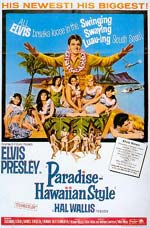
Filmed in K-POI Land |
Hopkins knew of this special relationship and asked if I thought he could get Colonel's blessing for his book. I told him "no," but if he was cool maybe Colonel would look the other way and not cause doors to slam in his face. I made a phone call. Hopkins received a wink-and-nod green light. He headed for Tupelo, Memphis and Nashville to talk to everyone who was a part of Elvis' life. Then he interviewed others from Hollywood to Vegas to New York. And Moffatt and I about our Hawaii escapades.
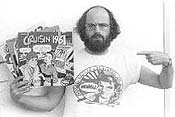
Ron Jacobs and Cruisin' albums |
There were projects at Watermark. Six months of research and obtaining clearances for the Cruisin' album series and the launch of American Top 40. I didn't hear much from Hopkins until 1971 when Elvis: A Biography was published. Two things struck me: What a good book. And, this could be the "rockumentary" on which we would take our time and do things correctly. Obtaining the radio rights to Elvis was as easy as it had been for Grass. I requisitioned a new Nagra recorder and the gear necessary to do National Geographic-type field recordings. "Why that?" asked Hopkins, "I have all my cassette interviews." "Because," I told him, "most journalists' tapes sound like the off-mike recordings that kidnappers make of their victims." We shaved off our beards and headed for Tupelo, Mississippi.
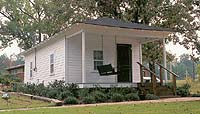
The birthplace of Elvis Presley, Tupelo, Mississippi |
The first person we interviewed was Mrs. Fay Harris. I knew that we were in the heart of history when the sprightly lady told us that she was a friend and neighbor of Mrs. Gladys Presley. "Elvis was born just a few blocks from where I live," she said. I'd heard various meanings of the term "shotgun house." A man as country as the Mississippi River itself told me the origin of the phrase. Seeing the restored Presley home bore out his explanation: "With that there hallway running down the middle you could walk in the front door and blast a shotgun right on through the back door."
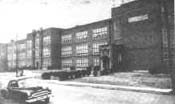
Humes High School |
We finished our Tupelo interviews and made like Elvis did years before. We headed for the big city, Memphis. When the Presley family moved there Elvis attended Humes High School. The only trace of The King was a small plaque in the main hallway mentioning their most famous alum. Totally into the craft of radio documentaries, I recorded the ambient sound of the empty hallway for use behind the narrative about Elvis' high school days. George Klein was class president and a buddy of Elvis. He was with WHBQ and showed Hopkins and I around, arranging for interviews of folks not even in the book.
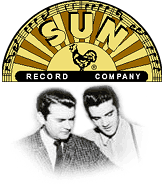
Sam Phillips and Elvis |
Sun Records was not yet a tourist attraction. There we met the former Marion Keisker and recorded her repeating the words she told Sam Phillips, about hearing "a white man who could sing like a Negro." Phillips himself, a remarkable man who never seems to age, recounted his first impressions of Elvis and the mythic Sun sessions. I recalled the lyrics to Sam Cooke's "Wonderful World," which described my pathetic school years: "Don't know much about history, Don't know much biology, Don't know much about a science book, Don't know much about the French I took," and realized that Hopkins and I were pursuing and preserving true pop cultural history.
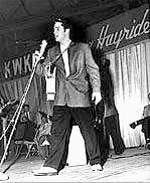
Elvis on The Louisiana Hayride |
We reached the point in Elvis' story where he and the boys—Scotty Moore and Bill Black—hit the road and were drawing crowds and driving audiences crazy with their new sound. People all over the South heard them on KWKH out of Shreveport, Louisiana. We talked to Scotty and drummer D. J. Fontana about those times (Black passed away in 1965), and interviewed others from Elvis' past like, the "Memphis Mafia," whom I met in Hawaii in 1957. And then we Hertzed it for Nashville.
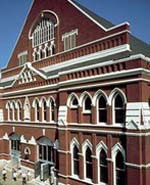
Ryman Auditorium |
Hopkins and I were anxious to visit Ryman Auditorium, home to the Grand Ol' Opry; and to talk with some of the Nashville musicians who played with Elvis during his career. We were in Music City and it seemed like everyone had a favorite Elvis story to tell. Producers, publishers, publicists; they all wanted to talk about The King. Fortunately the town was full of professional recording studios. Buying more quarter-inch recording tape and blank five-inch reels was no big deal.
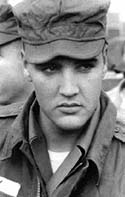
Pfc. Elvis Presley |
We'd taped dozens of people-from the pastor of the Tupelo First Assembly of God Church, to the couple who hired Elvis as a truck driver, to his uncle who manned the Graceland gates. It was time to return to Hollywood and cover another major chapter in Elvis' life: His time in the U. S. Army. The K-POI connection and Colonel Parker again provided material never heard before nationally. The only radio interview Elvis did when stationed in Germany was with Tom Moffatt, via phone, on K-POI. Because of his huge fan support in Hawaii, Elvis promised to do his first post-Army concert in Honolulu. He returned to the Islands and was greeted with a king-size Aloha.
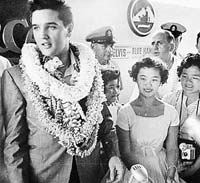
Elvis in Hawaii, 1961 |
We interviewed the people who witnessed The Elvis Presley Story first hand, from Honolulu to Hollywood to Hartford. No one could have written such a fairy tale. Until then I thought of "Rags to Riches" as Tony Bennett's 1953 pop hit. Ironically not only did it describe Elvis' rise to fame, but he himself later recorded the song. Colonel Parker invited me to watch Elvis tape his 1968 "comeback" TV special at NBC-TV. The show's director Steve Binder and audio engineer Bones Howe discussed the production for our program. We interviewed people involved with Elvis' movie career and his record- breaking performances in Las Vegas.
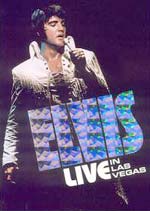
Viva Las Vegas |
Bill Hergonson, who would work with me on Watermark and KGB projects, moved into our cramped La Cienega Boulevard studio. We broke down the many reels of field recordings of interviews and sounds—categorizing, editing and timing material. History of Rock and Roll staffer Ellen Pelissero applied lessons learned during the making of that pioneer project. Eventually Hopkins had a working script for the 12-hour program. No auditions were held for narrator. There was only one choice, Wink Martindale. A Memphis deejay when Elvis exploded on the scene, Wink became a top rated Los Angeles jock and perpetual TV game show host. He was laid back, with a comforting touch of the South in his delivery and he was a pro to the max.
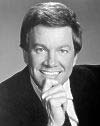
Wink Martindale |
I wanted to do something different for the show's overall musical theme. The History of Rock and Roll didn't have a recurring theme. It featured KHJ's a cappella jingles by Johnny Mann and that was it. To me, no matter the musical directions Elvis explored, I felt the most basic sounds—acoustic and unamplified—best represented where he came from. Whenever I met up with Elvis he was quiet and almost shy. In those days, unplugged. Never had a "soft" ballad such as "Love Me Tender" become a smash hit.
In Los Angeles I was fortunate to meet talented, interesting people in music, movies and TV. When KHJ became #1 and one of the most influential radio stations in America, artists came by to visit. "Boss Radio" presented concerts all around Southern California, starring the biggest names. The station was on Melrose Avenue, surrounded by the lots of three major movie studios. Actors, big and small, could be found eating lunch daily at the infamous Nickodell's, next to the KHJ building. After leaving there I worked with some world class artists at the Watermark "Farm Studio." (Carpentry by Harrison Ford.)

Dick Rosmini |
I never met a more accomplished musician-arranger-producer or more insouciant human being than Dick Rosmini. He agreed to lead the program's band. "How many ways can you play 'Hound Dog?'" I asked this guitar and banjo virtuoso. He replied, "How many ways do you want it?"
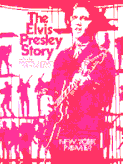
WPIX-FM Ad |
Finally, after months of effort by many, the program was primed to go. Nearly 150 songs and 70 people would tell the tale of Elvis. Across the U.S.A. radio stations signed up. The Elvis Presley Story was the first syndicated American program purchased by the British Broadcasting Corporation (BBC). It debuted on WPIX-FM, New York, on October 24, 1971.
The Elvis Presley Story was a commercial and critical success. I heard "on very good authority" that The King himself listened to most of it, and thought it was cool. So did a certain Colonel. Then, roll forward to Tuesday, August 17, 1977. I'd been back home in Honolulu for just over a year, doing mornings and programming KKUA-AM. Not long after leaving the studio, the bells on the news teletype machine rang out the way I heard them for the first time in 1963, when news of Jack Kennedy's murder came down the AP wire. That same rarely used word appeared: "FLASH." Details of Elvis' death sputtered in from Memphis.
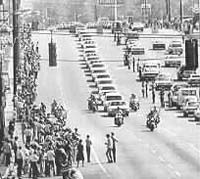
August 18, 1977 |
Jerry Hopkins and I were aboard a redeye that evening bound for L.A. In the Watermark North Hollywood studios the following morning the master tape for Hour 12 was disassembled. A new script with new elements and additional narration by Wink Martindale would comprise the 13th and final chapter. By the weekend it was complete and shipped to radio stations worldwide.
I'll always remember watching the press conference after that first Honolulu concert back in 1957, the one I emceed. Of all the questions and answers that day, one reply stuck in my mind. Someone asked, "Has success affected your life?" Speaking slowly, Elvis said, "Of course. I never realized anything like this was possible, that I'd ever be in Hawaii, or Las Vegas, or Hollywood. It's quite a change to jump into this stuff. If you're not careful, you'll crack up."
Ron Jacobs
Kaneohe, Hawaii
August 2002
In memory of Dick Rosmini, 1936-1995
"Hot soup!"
|

